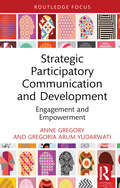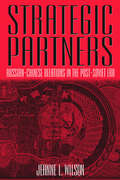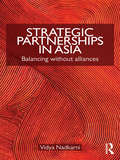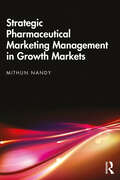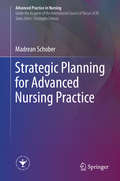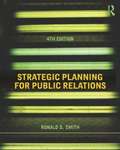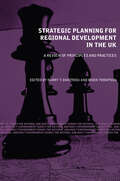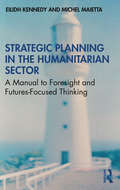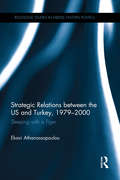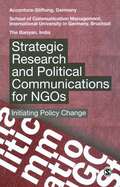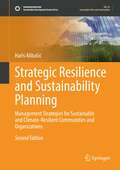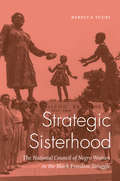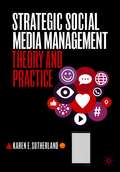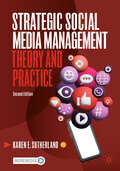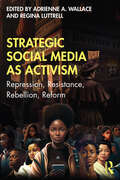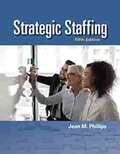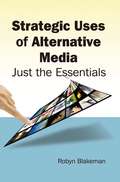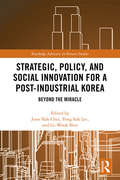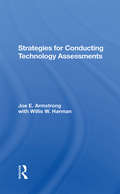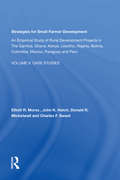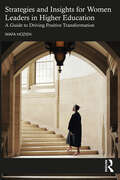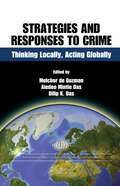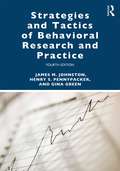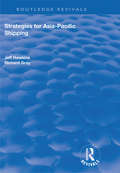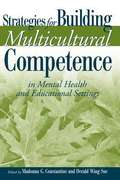- Table View
- List View
Strategic Participatory Communication and Development: Engagement and Empowerment
by Anne Gregory Gregoria Arum YudarwatiThere has been a recent shift in the nature of public engagement from a culture of paternalism and control towards a public-centred approach involving collaboration and co-creation. This book draws on public relations and development communication insights to build a new community engagement model for public sector organisations who wish to engage with rural communities in developing countries. This theoretical model also offers a practical framework for Government in particular to engage with and empower rural communities as they adopt and exploit infrastructure developments. The outcome is mutual benefit.By examining in detail how Government communicates with rural communities on renewable energy infrastructure projects in Indonesia, and underpinned by empirical research with those communities, this new participatory framework has been developed. It envisages progressive empowerment of rural communities as Government encourages active engagement on the installation and exploitation of renewable energy. This entails encouraging communities to determine for themselves their uses of sustainable energy sources and to take ownership of a co-determined future. In so doing, the Government itself is more likely to achieve its own renewable energy commitments.Research-based and combining theory with practice, this thought-provoking book will be welcomed by strategic communication and public relations scholars and practitioners alike.
Strategic Partners: Russian-Chinese Relations in the Post-Soviet Era
by Jeanne WilsonRussia's foreign policy experience in the first post-Soviet decade was marked by disappointments as well as surprising turns. Expectations that Russia would join the Western powers as an equal partner were frustrated, while relations with the People's Republic of China warmed considerably. Today, Russia's relationship with China is an important component of its overall foreign policy orientation, as the two states - one greatly diminished, the other clearly on the rise - have found themselves sharing an interest in curbing the power of the United States. In analyzing Russia's evolving foreign policy vis-a-vis China, the author takes into account the legacy of Soviet-era precedents; the simultaneous processes of economic policy change and integration into global economic structures; and military relations. By shedding light on the role of political realism, decision makers, and exogenous factors in Russian foreign policy, this analysis of an important bilateral relationship contributes to the larger project of understanding international relations and the dynamics of domestic and foreign policy change.
Strategic Partnerships in Asia: Balancing without alliances
by Vidya NadkarniThis book examines the nature and implications of the increasing interaction among three secondary powers in the world: China, Russia and India. It provides an in-depth analysis of the complex and often contradictory goals underlying their emerging strategic partnerships along with an assessment of the role these partnerships play in the larger regional and global contexts. In particular, it focuses on the important region of Asia/Eurasia, where these countries seek to increase their influence and compete against the prominence of the United States. Breaking new ground in looking at the ways in which the triad of bilateral strategic partnerships affect the countries’ individual aspirations for power, status and wealth, this book argues that their attempt to develop codified, formal bilateral partnerships and trilateral ties that seek to neither antagonise nor fully embrace each other is both a challenge to peace and security and an opportunity for cooperation. It concludes by suggesting scenarios under which competitive or cooperative economic and security orders may emerge. Clearly written and thoroughly accessible, this book will be an informative text for courses on international relations, international security, foreign policy and Asian and Russian politics.
Strategic Pharmaceutical Marketing Management in Growth Markets
by Mithun NandyIndia is the largest provider of generic drugs globally. The Indian pharmaceutical sector supplies over 50% of the global demand for various vaccines and, as a result, holds an important position in the global pharmaceutical sector. This book is a comprehensive study of pharmaceutical marketing management in the Indian context and similar growth markets. The book introduces the fast-paced and multi-faceted discipline of pharmaceutical marketing management through an in-depth discussion on the genesis and evolution of its marketing concept. Combining theory and practice, it offers a strategic approach to pharmaceutical marketing from an organizational and business perspective and explicates the practical applications of it. Richly supported by case studies, the book brings together fresh perspectives and approaches equally useful for students and professionals. This book will be of interest to academicians, advanced students, and practitioners of pharmaceutical marketing and pharmaceutical management. It will also be beneficial to those interested in business strategy, decision-making, and international marketing.
Strategic Planning for Advanced Nursing Practice (Advanced Practice in Nursing)
by Madrean SchoberThis eagerly anticipated book equips readers to understand the dynamics of policy processes, relevant decision-making and the significance of key decision-makers. It also emphasizes the usefulness of negotiation and diplomacy skills in order to support the development of an advanced nursing practice (ANP) initiative that involves the identification of pivotal issues to ensure that nurses unlock their full potential. Topics include a definition of strategic planning, essential factors to bear in mind, and frameworks to use in the context of formulating effective policies. By addressing outcome indicators and research, this volume offers a comprehensive approach to coordinated planning, and will appeal to advanced practice nurses, healthcare planners and policymakers, as well as administrators at hospitals and healthcare institutions.
Strategic Planning for Public Relations
by Ronald D. SmithThis innovative and popular text provides a clear pathway to developing public relations campaigns and other types of strategic communication. Implementing the pragmatic, in-depth approach of the previous editions, author Ronald D. Smith presents a step-by-step unfolding of the strategic campaign process used in public relations practice. Drawing from his experience in professional practice and in the classroom, Smith walks readers through the critical steps for the formative research, strategic and tactical planning, and plan evaluation phases of the process. Offering clear explanations, relevant examples, and practical exercises, this text identifies and discusses the decision points and options in the development of a communication program. The cases and examples included here explore classic real-world public relations situations as well as current, timely events. This fourth edition highlights the results of new research studies on opinions and practices within the discipline, and adds overviews of several award-winning public relations campaigns. As a classroom text or a resource for professional practice, this volume provides a model that can be adapted to fit specific circumstances and used to improve effectiveness and creativity in communication planning. It serves as an accessible and understandable guide to field-tested procedures, offering practical insights that apply to public relations campaigns and case studies coursework.
Strategic Planning for Regional Development in the UK (Natural and Built Environment Series)
by Harry T. Dimitriou Robin ThompsonWith contributions from leading academics and practitioners, Strategic Planning for Regional Development in the UK is the most up-to-date treatment of a fast-changing subject. The book discusses: The evolution of regional planning in the UK and the strategic thinking involved The spatial implications of regional economic development policies The methods and techniques needed for the implementation of strategic planning for regional development How strategic planning for regional development is currently put into practice in three UK regions with different priorities. Strategic Planning for Regional Development in the UK is essential reading for students and academics working within strategic and regional planning and provides policy makers and practitioners with a comprehensive and thought provoking introduction to this critically important emerging field.
Strategic Planning in the Humanitarian Sector: A Manual to Foresight and Futures-Focused Thinking
by Eilidh Kennedy Michel MaiettaThis book provides humanitarian practitioners and policy makers with a manual for how to apply foresight and strategy in their work. Drawing on extensive research, the book demonstrates in practical terms how embedding futures-focused thinking into practice can help humanitarian actors to enhance their impact and fit for the future. The book provides readers with a step-by-step guide to an innovative combination of tools and methods tested and refined over the course of several years. However, it also goes beyond this, by grounding the approach within the broader ambition of making humanitarian action more effective. Overall, the analytical and strategic processes outlined in this book will accompany a decision maker through every stage of creating a robust, agile and impactful long-term strategy. This accessible guide will be an essential point of reference for practitioners and decision makers in the humanitarian ecosystem, as well as students studying humanitarian affairs, global development, conflict studies and international relations.
Strategic Relations Between the US and Turkey 1979-2000: Sleeping with a Tiger (Routledge Studies in Middle Eastern Politics)
by Ekavi AthanassopoulouTaking the period from the end of the 1970s to the end of the 1990s, this book critically examines the evolution of the strategic relationship between the US and Turkey during this period, with a particular focus on the Middle Eastern context. Strategic Relations Between the US and Turkey employs interviews with US, Turkish and Israeli officials and archival research in order to offer an alternative reading of the realities that shaped bilateral co-operation through multi-level analysis. The unraveling of these realities enlightens the reader about the past course of events but also aids the understanding of the dynamics of the relationship today. Essential reading for students and scholars of U.S. and Turkish foreign policy, this study of co-operation between a super-power and a relatively weak state in the international system will also be of use to those interested in International Relations, Diplomatic History and World Politics more broadly.
Strategic Research and Political Communication for NGOs: Initiating Policy Change
by The Accenture Foundation School of Communication Management The BanyanThis unique and easy-to-use book offers a new paradigm to NGO managers in effecting policy change. Introducing corporate research and strategy tools such as market and organizational analysis, it goes on to apply these to case studies to exemplify the remarkable similarities between the NGO sector and the for-profit sector. Drawing on principles of corporate governance, the author presents a clear, step-by-step, hands-on approach to positioning one′s cause effectively with stakeholders, policy-makers, media and the general public. By recognizing the role of communication in the 21st century, the book emphasizes the importance of effectively using new channels and interfaces of digital communication (such as online social networking sites) to generate and maintain visibility, mobilize campaigns and initiate policy change. With illustrative examples of Best Practice based on case studies of Indian and International NGOs, this book is an essential read for NGO managers and communication programme officers, social work administrators and other professionals engaged in the field of social work.
Strategic Resilience and Sustainability Planning: Management Strategies for Sustainable and Climate-Resilient Communities and Organizations (Sustainable Development Goals Series)
by Haris AlibašićThe book examines management strategies for developing and implementing strategic resilience and sustainability plans for sustainable and climate-resilient communities and organizations. It examines trends in resilience and sustainability planning, highlighting best practices and case studies. The book explores Quadruple Bottom Line strategies and methods to implement resilience and sustainability-related initiatives in organizations and communities. It also examines diverse perspectives on climate resilience, climate preparedness and readiness, greenhouse gas emission reductions policies, climate adaptation and mitigation, disaster preparedness and readiness, and sustainable energy policies and projects. Additionally, the book offers insights on strategic resilience and sustainability planning during a pandemic as well as private sector perspectives on strategic resilience and sustainability. In chapter one, the author presents expanded definitions of strategic resilience and sustainability as well as mechanisms reshaping communities and organizations. Chapter two examines strategic planning processes for communities and organizations and lays out planning steps. Chapter three offers insights into community and organizational level engagement, looking at internal and external stakeholders, organizers, partners, collaborators, and implementers of distinct stages of strategic resilience and sustainability planning. Chapter four outlines measurements and tactics to track and improve strategic resilience and sustainability reporting mechanisms using the quadruple bottom line strategy. It offers a resilience progress report to ensure accountability, answerability, transparency, and good governance. Chapter five details the implementation of a strategic resilience and sustainability plan, describing programs and initiatives to achieve resilient and sustainable communities and organizations. Chapter six extensively examines the theoretical and practical intersection between climate change, resilience, and sustainability. Chapter seven reviews resources available for strategic resilience and sustainability plans to aid communities and organizations. Chapter eight assesses the current and future state of resilience and sustainability in communities and organizations, including concerns surrounding climate change, pandemics, disaster resilience, and emergency management and preparedness.
Strategic Sisterhood: The National Council of Negro Women in the Black Freedom Struggle
by Rebecca TuuriWhen women were denied a major speaking role at the 1963 March on Washington, Dorothy Height, head of the National Council of Negro Women (NCNW), organized her own women's conference for the very next day. Defying the march's male organizers, Height helped harness the womanpower waiting in the wings. Height's careful tactics and quiet determination come to the fore in this first history of the NCNW, the largest black women's organization in the United States at the height of the civil rights, Black Power, and feminist movements of the 1960s and 1970s.Offering a sweeping view of the NCNW's behind-the-scenes efforts to fight racism, poverty, and sexism in the late twentieth century, Rebecca Tuuri examines how the group teamed with U.S. presidents, foundations, and grassroots activists alike to implement a number of important domestic development and international aid projects. Drawing on original interviews, extensive organizational records, and other rich sources, Tuuri's work narrates the achievements of a set of seemingly moderate, elite activists who were able to use their personal, financial, and social connections to push for change as they facilitated grassroots, cooperative, and radical activism.
Strategic Social Media Management: Theory and Practice
by Karen E. SutherlandThis textbook provides a lively introduction to the fast-paced and multi-faceted discipline of social media management with international examples and perspectives. Aside from focusing on practical application of marketing strategy, the textbook also takes students through the process of strategy development, ethical and accurate content curation, and strategy implementation, through detailed explanations of content creation.Combining theory and practice, Strategic Social Media Management teaches students how to take a strategic approach to social media from an organisational and business perspective, and how to measure results. Richly supported by robust and engaging pedagogy and cases in each chapter, it integrates perspectives from public relations, marketing and advertising, and examines key topics such as risk, ethics, privacy, consent, copyright issues, and crises management. It also provides dedicated coverage of content strategy and campaign planning and execution.Reflecting the demands of contemporary practice, advice on self-care for social media management is also offered, helping to protect people in this emerging profession from the negativity that they can experience online when managing an organisation’s social media presence. After reading this textbook, students will be able to develop a social media strategy, curate accurate and relevant content, and create engaging social media content that tells compelling stories, connects with target audiences and supports strategic goals and objectives.This is an ideal textbook for students studying social media strategy, marketing and management at undergraduate level. It will also be essential reading for marketing, public relations, advertising and communications professionals looking to hone their social media skills and strategies.
Strategic Social Media Management: Theory and Practice
by Karen E. SutherlandThis textbook provides a lively introduction to the fast-paced and multi-faceted discipline of social media management, with international perspectives, AI approaches and tools to enhance the learning experience. Aside from focusing on practical application, the textbook takes readers through the process of strategy development and implementation, ethical and accurate content curation, and strategic content creation.Combining theory and practice, Strategic Social Media Management teaches readers how to take a strategic approach to social media from organisational and business perspectives, and how to measure results. Richly supported by robust and engaging pedagogy and case studies, it integrates public relations, marketing and advertising perspectives, and examines key issues including risk, ethics, privacy, consent, copyright, and crisis management.Reflecting the demands of contemporary practice, advice on self-care is also provided, helping to protect emerging Social Media Managers from the negativity they can experience online. By the end, readers will be able to develop a social media strategy, understand accurate and relevant content curation, and create engaging social media content that tells compelling stories, connects with target audiences and supports strategic goals and objectives.This is an ideal textbook for students learning social media strategy, marketing and management at undergraduate level. It is also essential reading for business owners, marketing, public relations, advertising and communications professionals looking to hone their social media skills.The first edition of this textbook won a Book Excellence Award, a Silver International Stevie Award for Best Business Book and was named in the Best 100 Public Relations eBooks of All Time by the Book Authority.
Strategic Social Media as Activism: Repression, Resistance, Rebellion, Reform
by Adrienne A. Wallace and Regina LuttrellDrawing on a range of theoretical and empirical perspectives, this volume examines the roles strategic communications play in creating social media messaging campaigns designed to engage in digital activism. As social activism and engagement continue to rise, individuals have an opportunity to use their agency as creators and consumers to explore issues of identity, diversity, justice, and action through digital activism. This edited volume situates activism and social justice historically and draws parallels to the work of activists in today’s social movements such as modern-day feminism, Black Lives Matter, #MeToo, Missing Murdered Indigenous Women, and We Are All Khaled Said. Each chapter adds an additional filter of nuance, building a complete account of mounting issues through social media movements and at the same time scaffolding the complicated nature of digital collective action. The book will be a useful supplement to courses in public relations, journalism, social media, sociology, political science, diversity, digital activism, and mass communication at both the undergraduate and graduate level.
Strategic Staffing
by Jean PhillipsStrategic Staffing prepares all current and future managers to take a strategic and modern approach to the identification, attraction, selection, deployment, and retention of talent.
Strategic Uses of Alternative Media: Just the Essentials
by Robyn BlakemenDesigned for students and practitioners in the fields of organizational behavior and human resource training and development, this book examines improving organizational communication. Terrence Gargiulo shows how the use of storytelling is the key to effective communication and learning.
Strategic, Policy and Social Innovation for a Post-Industrial Korea: Beyond the Miracle (Routledge Advances in Korean Studies)
by Gi-Wook Shin Joon Nak Choi Yong Suk LeeExport-oriented industrialization has transformed the Korean economy so profoundly that it has become known as the "Miracle on the Han." Yet, this industrial model has become fragile, as Korea’s chaebols are being challenged by Chinese competitors. Attempts to seek out new engines of economic growth have failed, or remain underdeveloped, while a looming demographic crisis threatens to exacerbate Korea’s problems. This book outlines a blueprint for overcoming these challenges, moving beyond the business strategies, government policies, and socio-cultural patterns established under export-oriented industrialization. Written by a stellar line-up of international contributors, its central proposition is that social change is needed to support the strategic and operational transformation of the chaebol and SMEs. Specifically, it stresses the need for an appreciation of the gender, national, and ethnic diversity emerging within the Korean workplace today. If properly leveraged, such diversity has the potential to reduce the groupthink that hampers the creativity and responsiveness of Korean firms today, as well as facilitating greater success in overseas markets. Taking an interdisciplinary approach, this book will be useful to students and scholars in Korean Studies, as well as those studying business, economics, and sociology more broadly in East Asia.
Strategies For Conducting Technology Assessments
by Willis W. Harman Joe E. ArmstrongUsing reviews of special reports and personal interviews with team members of recent National Science Foundation-sponsored assessments, the authors have assembled an eight-step functional strategy for conducting technology assessments. The steps are set within a framework that embodies the three key elements of all assessments: technology descripti
Strategies For Small Farmer Development: An Empirical Study Of Rural Development Projects In The Gambia, Ghana, Kenya, Lesotho, Nigeria, Bolivia, Columbia, Mexico, Paraguay And Peru
by Elliott R. Morss Donald R. Mickelwait John K. Hatch Charles F. SweetThis volume provides information on what can be done to increase the well-being and productivity of the small farmer in the Third World, focusing on design and implementation of rural development projects in the Gambia, Ghana, Kenya, Lesotho, Nigeria, Bolivia, Colombia, Mexico, Paraguay and Peru.
Strategies and Insights for Women Leaders in Higher Education: A Guide to Driving Positive Transformation
by Wafa HozienThis book delves into critical factors for women’s success in academia, offering strategies, and counsel anchored in a robust theoretical framework.Hozien’s thoughtful, interdisciplinary approach to women leadership culminates in a comprehensive understanding of the critical factors that can influence career success in higher education. Grounded by an intersectional lens and data-driven analysis, the book’s focus on minority female populations informs the inherent challenges and shifting representation in educational leadership. Each chapter integrates real-world examples, case studies, and immediately actionable advice to advocate for and support current and aspiring female leaders, administrators, and policymakers.A masterful blend of theory and practice, this book’s timely insights empower women to take charge of their leadership journeys with the intention of fostering a generation of confident and capable academic leaders who can drive positive transformation.
Strategies and Responses to Crime: Thinking Locally, Acting Globally (International Police Executive Symposium Co-Publications)
by Dilip K. Das Aiedeo Mintie Das Melchor De GuzmanEvery year, esteemed scholars and practitioners meet at the International Police Executive Symposium to discuss contemporary issues in policing and share ideas about effective strategies in their jurisdictions. Drawn from the proceedings at the Thirteenth Annual Meeting held in Turkey and updated with new developments since the conference, Strategi
Strategies and Tactics of Behavioral Research and Practice
by James M. Johnston Henry S. Pennypacker Gina GreenStrategies and Tactics of Behavioral Research and Practice focuses on the most effective methods for measuring and evaluating changes in behavior. The authors provide the rationale for different procedures for measuring behavior and designing within-subject comparisons between control and intervention conditions. The text explains the strengths and weaknesses of methodological alternatives for every topic so that behavioral researchers and practitioners can make the best decisions in each situation. This classic text has been extensively revised to be more accessible and practical. Not only does it feature much more discussion of how research methods are relevant to today’s practitioners, it also includes additional examples based on field research and service delivery scenarios. With expanded coverage on creating experimental designs, as well as new chapters on behavioral assessment, the statistical analysis of data, and ethical issues associated with research methods, this book provides a strong foundation for direct behavioral measurement, within-subject research design, and interpretation of behavioral interventions. Enriched with more pedagogical features, including key terms, tables summarizing important points, figures to help readers visualize text, and updated examples and suggested readings, this book is an invaluable resource for students taking courses in research methods. This book is appropriate for researchers and practitioners in behavior analysis, psychology, education, social work, and other social and health science programs that address questions about behavior in research or practice settings.
Strategies for Asia-Pacific Shipping (Routledge Revivals)
by Richard Gray Jeff HawkinsThis title was first published in 2000. This text focuses on one geographical and economical area - the Asia-Pacific region, on one type of decision makers - commercial shipowners, and on one type of business strategy - corporate level strategy, to show economic change and how organizations manage that change. This book discusses the challenges that shipowners face to take advantage of that growth. It also looks at the lack of information on strategic decision making that could assist the shipowners in taking advantage of the economic situation. The chapters cover the types of business strategies available and how to select the criteria for selecting one of those strategies.
Strategies for Building Multicultural Competence in Mental Health and Educational Settings
by Derald Wing Sue Madonna G. ConstantineThis timely reference also considers building multicultural competence around indigenous healing practices; in clinical supervision contexts; and in culturally sensitive research. Taken together, the book is a much-needed blueprint for making culturally informed decisions, explaining how the multicultural initiatives you implement today can help shape the field's future.
